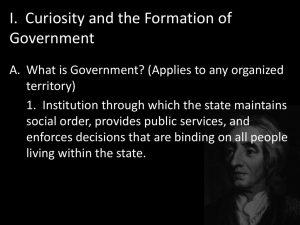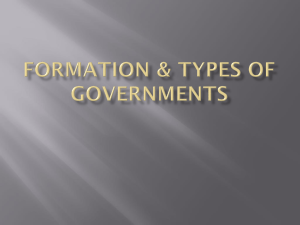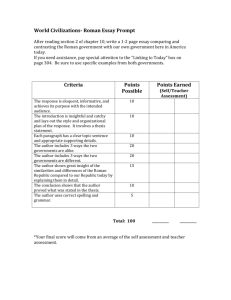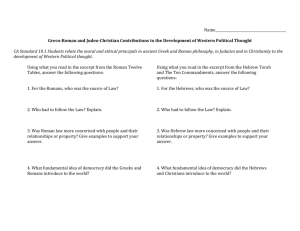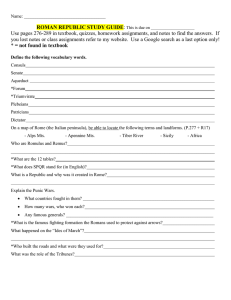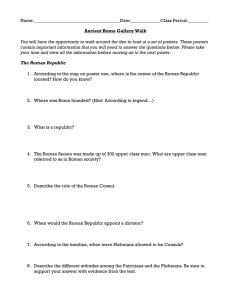Social Studies 11/10/14
advertisement
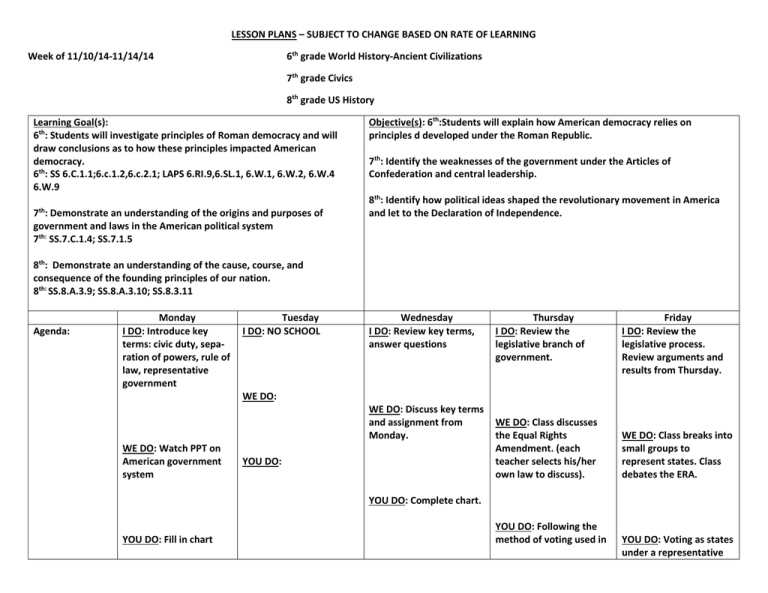
LESSON PLANS – SUBJECT TO CHANGE BASED ON RATE OF LEARNING 6th grade World History-Ancient Civilizations Week of 11/10/14-11/14/14 7th grade Civics 8th grade US History Learning Goal(s): 6th: Students will investigate principles of Roman democracy and will draw conclusions as to how these principles impacted American democracy. 6th: SS 6.C.1.1;6.c.1.2,6.c.2.1; LAPS 6.RI.9,6.SL.1, 6.W.1, 6.W.2, 6.W.4 6.W.9 th 7 : Demonstrate an understanding of the origins and purposes of government and laws in the American political system 7th: SS.7.C.1.4; SS.7.1.5 Objective(s): 6th:Students will explain how American democracy relies on principles d developed under the Roman Republic. 7th: Identify the weaknesses of the government under the Articles of Confederation and central leadership. 8th: Identify how political ideas shaped the revolutionary movement in America and let to the Declaration of Independence. 8th: Demonstrate an understanding of the cause, course, and consequence of the founding principles of our nation. 8th: SS.8.A.3.9; SS.8.A.3.10; SS.8.3.11 Agenda: Monday I DO: Introduce key terms: civic duty, separation of powers, rule of law, representative government Tuesday I DO: NO SCHOOL Wednesday I DO: Review key terms, answer questions Thursday I DO: Review the legislative branch of government. Friday I DO: Review the legislative process. Review arguments and results from Thursday. WE DO: WE DO: Discuss key terms and assignment from Monday. WE DO: Watch PPT on American government system YOU DO: WE DO: Class discusses the Equal Rights Amendment. (each teacher selects his/her own law to discuss). WE DO: Class breaks into small groups to represent states. Class debates the ERA. YOU DO: Complete chart. YOU DO: Fill in chart YOU DO: Following the method of voting used in YOU DO: Voting as states under a representative the Roman Republic, male students will vote. government, all students vote on the ERA. Explain the term “civic duty.” Give 2 examples of someone exercising his/her civic duty. Explain the term “amendment.” If you could amend the constitution, what change would you like to see? Explain the term “debate.” Identify a topic that you would like to debate. Essential How has America incurQuestions/Higher porated democratic Order Questions: principles developed under the Roman Republic? Student Product: Chart How has America incorporated democratic principles developed under the Roman Republic? How has America incorporated democratic principles developed under the Roman Republic? How has America incorporated democratic principles developed under the Roman Republic? Chart Vote results Debate, vote results Word Wall: Representative democracy, civic duty, rule of law, separation of powers Representative democracy, civic duty, rule of law, separation of powers Representative democracy, civic duty, rule of law, separation of powers Representative democracy, civic duty, rule of law, separation of powers Unfinished classwork Unfinished classwork List and explain what information you need to understand the 4 key terms. In one paragraph, describe In one paragraph, describe In one paragraph, the concept of “Separathe term “Representative describe the results of tion of Powers.” Government.” “voting” for the ERA under the method used in Roman Republic and the USA (as demonstrated in class). Bell Ringer: Explain the term “representative government.” Identify which branch of government uses a representative form. Homework: Exit Ticket: 1. 2. 3. 4. 5. 6. 7. 8. ESE MODIFICATIONS: Vary presentations of subject matter. Cooperative learning. Extra time. Provide outlines/notes of key concepts and ideas. Modified assignments, quizzes, and tests. Breakdown lesson into smaller segments-“chunking.” Specialized grading criteria. Modified/supplementary materials. MODIFICATIONS ARE MADE FOR EACH STUDENT BASED ON HIS OR HER INDIVIDUAL EDUACATION PLAN AND ARE DESIGNDED TO HELP STUDENTS ACCELERATE AND ACCESS BENCHMARKS. 1. 2. 3. 4. 5. 6. 7. 8. 9. 10. 11. 12. ELL (ESOL) MODIFICATIONS: Context clues (gestures, expression, and body language). Multiple media to provide different stimuli Individualized instruction/assistance. Peer tutoring and Small Group Instruction. Visual and audiovisual aids Adjust or shorten assignments. Alternative assessments. Adapt text materials to facilitate comprehension. Build on student’s existing knowledge. Modify speech. Extra time. Specialized grading criteria.

